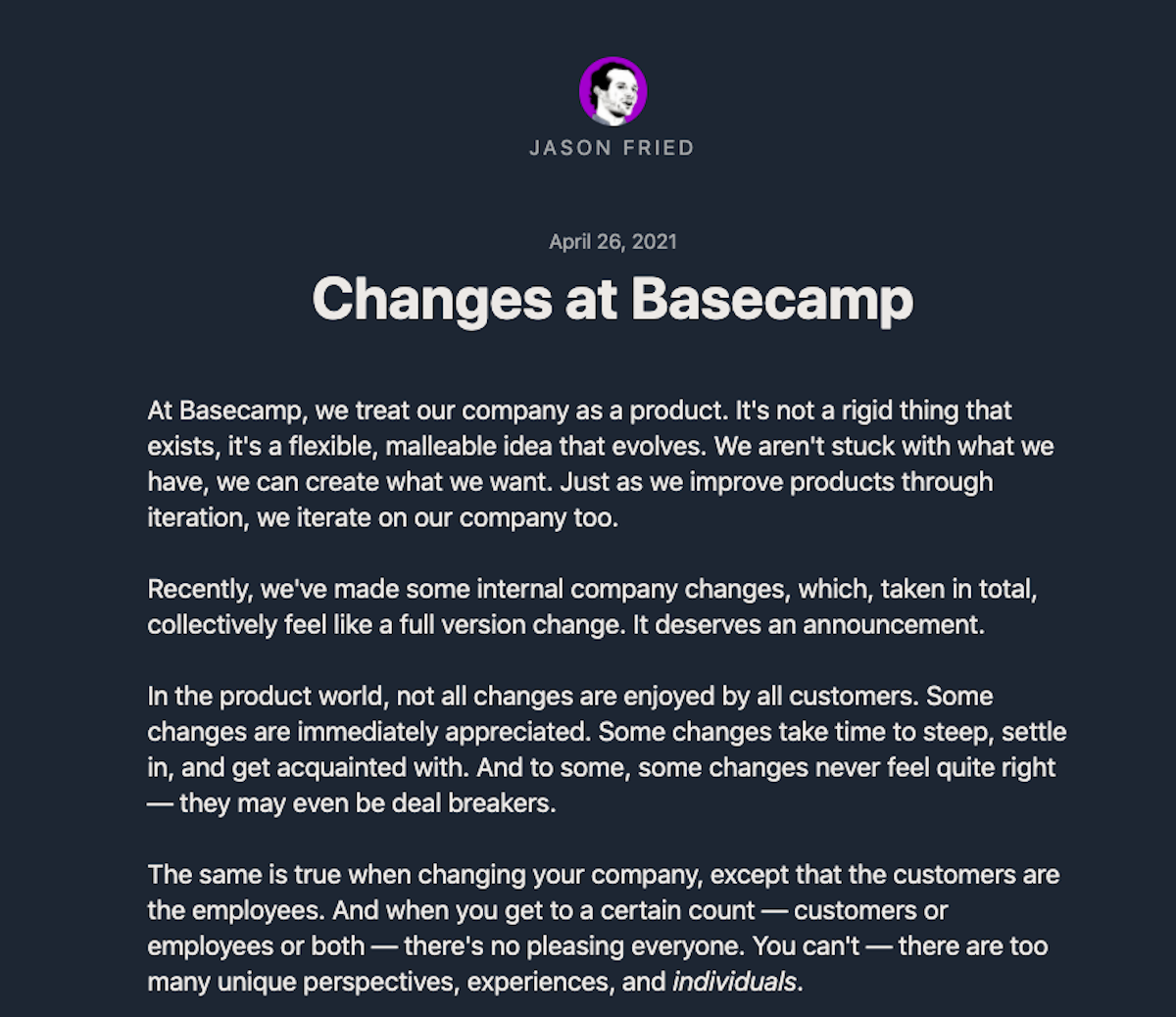It was the culture memo heard ’round the tech world.
On Monday, Chicago-based project management and team communication platform maker Basecamp rolled out a slew of new workplace policies in a blog post titled “Changes at Basecamp” written by prominent founder and CEO Jason Fried.
“At Basecamp, we treat our company as a product. It’s not a rigid thing that exists, it’s a flexible, malleable idea that evolves,” Fried begins.
Among the immediate changes were new policies to not allow “societal and political discussions” on the company Basecamp account, as well as to eliminate internal committees and “paternalistic” health and wellness policies, like a fitness benefit or continuing education allowances.
“You shouldn’t have to wonder if staying out of it means you’re complicit, or wading into it means you’re a target,” Fried wrote in the post. “These are difficult enough waters to navigate in life, but significantly more so at work. It’s become too much. It’s a major distraction. It saps our energy, and redirects our dialog towards dark places.”
It’s a move away from what many companies have wrestled with in the last year or so: how to make room for employee’s lives and identities while we work from home amid multiple crises.
And it’s far removed from what we’ve heard from local tech and entrepreneurial leaders, such as Coded by Kids founder and CEO Sylvester Mobley, who said “every organization has a responsibility” to talk about racial inequity, or Technical.ly’s own CEO, Chris Wink, who urged white org leaders not to remain silent on issues of racial injustice. We even heard step-by-step instructions for starting these conversations from local HR pros.
But Basecamp’s changes boil down to making work just about work, Fried argues.
“Employees are free to take up whatever cause they want, support whatever movements they’d like, and speak out on whatever horrible injustices are being perpetrated on this group or that (and, unfortunately, there are far too many to choose from),” the CEO wrote. “But that’s their business, not ours. We’re in the business of making software, and a few tangential things that touch that edge. We’re responsible for ourselves. That’s more than enough for us.”
These changes, he says, will allow for a “return to whole minds that can focus fully on the work we choose to do.”
The feedback on social media was swift, including from local technologists. Some employees shared that the announcement hadn’t been handled internally before it went public.
https://twitter.com/georgeclaghorn/status/1387041235697901571
Many critiqued that it’s impossible to be a person who does work without bringing your whole self to work.
https://twitter.com/fox/status/1386836877857099777
Basecamp: Your life is really getting in the way of our work. Also, please use HEY
— Shannon Wink (@shannonawink) April 27, 2021
When I first started coding, I heard about this awesome company called @basecamp; it’s been a goal to work at a company like them. How disappointing to hear this https://t.co/3IadzkBmzM
— NidaCodes (@NidaCodes) April 26, 2021
So @basecamp @heyhey with this blog post that you just put out, are you trying to just tell your Black and PoC consumers that they aren't worth shit to you or is it because your white directors read a book and thought that this would be enlightening? https://t.co/t6LOahxzZ6
— The Nightmare Before Sailor Ghoul Licking Prada (@javavvitch) April 26, 2021
Wow. This is incredibly disappointing.
I've spent the last 5 years re-skilling out of working in restaurants and into web dev, and I've had @basecamp in my brain as a rare example of a tech company that seemed to share my values.
Aaaaand they just threw it all in the bin. RIP.
— 2021 sure was a thing huh (@logan_ayliffe) April 26, 2021
"Basecamp should be a place where employees can come to work…without having to deal with heavy political or societal debates unconnected to that work."
LGBTQ+ and BIPOC folks have never had this privilege.https://t.co/R9TbyPkpx7
— Kitzy (@heykitzy) April 27, 2021
It’s hard to know what the worst take is in the Basecamp founders manifesto. For a company that was often praised for embracing and rising on values, Jason and David have morally bankrupt the company they built in one stupid blog.https://t.co/1N8KLMRJlU
— Rachel Vandernick (@VandernickR) April 27, 2021
Basecamp as a tool is awful anyway. But now there is another reason not to use it.
— Tracy Levesque (@LilJimmi) April 27, 2021
While much of the social media response was negative, a handful praised the hands-off-personal-topics approach or said it wasn’t a big deal.
https://twitter.com/forstmeier/status/1386877069024432128
Basecamp letter not a big deal. A reminder that companies are not communities. If they seem so, it's because the owners have allowed it. They can always cancel that at will. If you want to work for or do business w/a company that acts like community, walk away when it doesn't.
— Timothy Burke (@swarthmoreburke) April 26, 2021
I’d like to hear from you, company leaders or employees, about this type of policy: Does this make sense to you? Can a workplace ever be free of “social or political discussions?” Should they be? Shoot me an email at paige@technical.ly.
Join the conversation!
Find news, events, jobs and people who share your interests on Technical.ly's open community Slack

Philly daily roundup: East Market coworking; Temple's $2.5M engineering donation; WITS spring summit

Philly daily roundup: Jason Bannon leaves Ben Franklin; $26M for narcolepsy treatment; Philly Tech Calendar turns one

Philly daily roundup: Closed hospital into tech hub; Pew State of the City; PHL Open for Business


